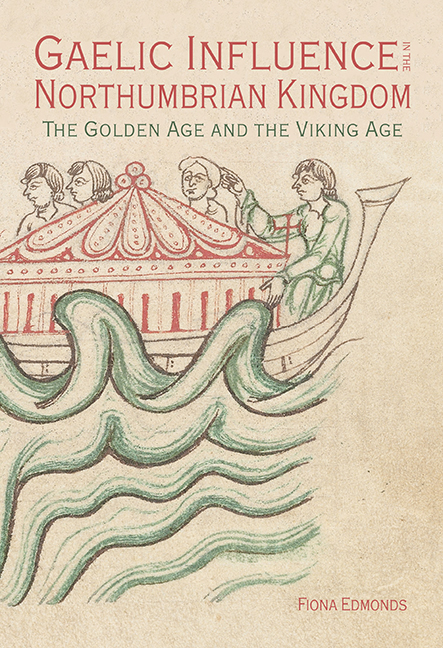Book contents
- Frontmatter
- Contents
- List of Illustrations
- Acknowledgements
- List of Abbreviations
- Preface: An Eventful Voyage
- 1 Concepts and Historiography of the Northumbrian and Gaelic Worlds: Medieval to Modern
- 2 Exiles and Emperors: Gaelic-Northumbrian Political Relations in the Golden Age
- 3 Fragmentation and Opportunity: From the Eighth Century to the Viking Age
- 4 Pathways through the Past: Routes between the Gaelic World and the Northumbrian Kingdom
- 5 A Golden Age of Ecclesiastical Contacts
- 6 Saints and Seaways in the Viking Age
- 7 Medieval Multilingualism: Gaelic Linguistic Influence in the Northumbrian Kingdom
- 8 Movement and Material Culture in the Northumbrian and Gaelic Worlds
- Conclusion: Individuals and Influences
- Bibliography
- Index
- STUDIES IN CELTIC HISTORY
1 - Concepts and Historiography of the Northumbrian and Gaelic Worlds: Medieval to Modern
Published online by Cambridge University Press: 28 February 2020
- Frontmatter
- Contents
- List of Illustrations
- Acknowledgements
- List of Abbreviations
- Preface: An Eventful Voyage
- 1 Concepts and Historiography of the Northumbrian and Gaelic Worlds: Medieval to Modern
- 2 Exiles and Emperors: Gaelic-Northumbrian Political Relations in the Golden Age
- 3 Fragmentation and Opportunity: From the Eighth Century to the Viking Age
- 4 Pathways through the Past: Routes between the Gaelic World and the Northumbrian Kingdom
- 5 A Golden Age of Ecclesiastical Contacts
- 6 Saints and Seaways in the Viking Age
- 7 Medieval Multilingualism: Gaelic Linguistic Influence in the Northumbrian Kingdom
- 8 Movement and Material Culture in the Northumbrian and Gaelic Worlds
- Conclusion: Individuals and Influences
- Bibliography
- Index
- STUDIES IN CELTIC HISTORY
Summary
This book explores the evolution of contact between Gaelic and Northumbrian spheres over the course of four centuries. One event encapsulates the complexity of the theme, namely, the Northumbrian king Ecgfrith's raid on the plain of Brega in Ireland (684). The expedition occurred in defiance of the revered churchman Ecgberht, who saw it as an unwarranted attack on a people who had never harmed the king. In a similar vein, the Northumbrian historian Bede characterised the raid as an attack on gens innoxia, et nationi Anglorum semper amicissima ‘an inoffensive people who had always been friendly to the English’. Bede saw Ecgfrith’s subsequent defeat and death in battle against the Picts as just punishment for this impietas ‘wickedness’. The event continued to haunt depictions of relations across the Irish Sea for many centuries, as seen in Conchubranus's mid-eleventh-century Vita Sanctae Monennae, where the incident is recast in light of contemporary themes in Irish–English relations. This later retelling echoes Bede's picture of complex connections, involving not only enmity but also ecclesiastical bonds and friendships forged in exile.
Bede framed his account as a momentous incident in the interactions between gentes ‘peoples’. The protagonist, Ecgfrith, was rex Northanhymbrorum ‘king of the Northumbrians’, and a representative of natio Anglorum ‘the nation of the English’. Those attacked, the gens innoxia, were the inhabitants of Ireland, for which Bede used the terms ‘Hibernia’ and ‘Scottia’. When describing the aftermath of the battle in Pictland, he wrote of Scotti, qui erant in Brittania, indicating that ‘Scotti’ was a term for the inhabitants of the pan-Gaelic world. Thus in this account we see complex groupings of people: Scotti targeted in Ireland, but also resident in Britain; Northumbrians who were also English. For Bede, ‘the medieval world was undoubtedly a world of peoples, gentes’, as Rees Davies wrote. Yet how far did this consciousness seep through society, and how is it manifested in our sources? I begin by exploring how early medieval writers conceptualised peoples, before examining contemporary terminology for the Gaelic and Northumbrian worlds. I then review the historiography of the topic, arguing for an appreciation of the complexity and enduring significance of Northumbrian-Gaelic relations.
- Type
- Chapter
- Information
- Gaelic Influence in the Northumbrian KingdomThe Golden Age and the Viking Age, pp. 1 - 22Publisher: Boydell & BrewerPrint publication year: 2020



